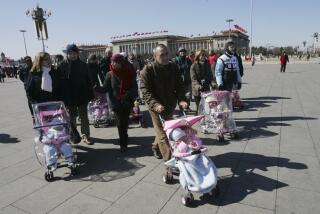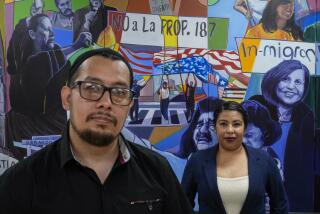Parents Celebrate Adoptee Citizenship Law
It had all the trappings of a traditional celebration for new citizens: flag-waving, the Pledge of Allegiance and teary-eyed relatives.
But Tuesdayâs event at Veteransâ Park in Redondo Beach was special. Most of its honored guests were under 3 feet tall and less than 5 years old.
They were among the estimated 75,000 foreign-born children adopted by U.S. parents who became American citizens Tuesday as the Child Citizenship Act of 2000 went into effect. From now on, foreign-born children will automatically become citizens upon adoption if their parents are citizens and live in the United States.
About 200 parents and children from Los Angeles and Orange counties gathered at the oceanside park in Redondo Beach to mark the new law, which they say will save them years of paperwork and heartache. The event was sponsored by Holt International Childrenâs Service, an overseas adoption agency that many of the families used.
Elsewhere throughout Southern California, other families celebrated in community rooms, churches, schools and restaurants.
Jill Han and Dai Sup Han of Torrance, who adopted their 13-month old daughter, Karah, from South Korea last year, said they were excited by the new law and the chance to avoid the paperwork previously required for citizenship.
âYouâd gone through so much to adopt your child, and then you are told on top of that you have to do all these things to get your kid to become a citizen. It is frustrating,â Jill Han said.
Getting citizenship now for Karah makes it easier to travel overseas. But more important, âitâs an added sense of permanency,â her mother said.
According to Maureen Evans, interim director of the Maryland-based Barker Foundation for Adoption, which also works overseas, the new law is extremely important.
âItâs a real recognition that adopted families are real families,â she said in a telephone interview. âIt doesnât negate the childâs country of origin. But it says you are now part of the U.S. family.â
The Child Citizenship Act, signed into law by former President Bill Clinton in October, is not retroactive for adoptees over 18 years old, nor does it cover children adopted by U.S. citizens living outside the country.
Although U.S. citizens began adopting children from foreign countries in large numbers during the 1950s and 1960s, Evans said the push for the law did not begin until a decade ago. As federal Immigration and Naturalization Service offices got busier, some families were waiting up to three years for an adopted child to receive citizenship, she said.
Outrage began to build over what families deemed a lack of respect for adopting parents, she added. âPeople felt the rights of adoptive parents should be similar, if not identical, to those who give birth,â she said.
Parents of adopted children became more concerned after a 1996 immigration law made it possible for noncitizens to be deported after being convicted and serving time for a felony. U.S. citizens adopt about 19,000 foreign-born children a year, officials estimate. In recent years, Russia, China, South Korea and Guatemala have provided the largest numbers of children.
Dave and Cindy Akiyama of Rolling Hills Estates brought their daughters Hannah, 5, and Naomi, 2, to the Redondo Beach event. Both girls were adopted from China.
Hannah said she was excited by the party. When asked whether she was now a U.S. citizen, the little girl gave an assured âYes.â But when asked what that meant, she shrugged and said: âI donât know.â
More to Read
Sign up for Essential California
The most important California stories and recommendations in your inbox every morning.
You may occasionally receive promotional content from the Los Angeles Times.










